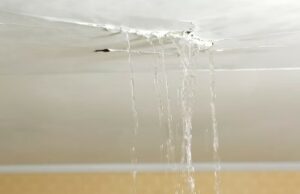
Water damage in your home can be a silent invader, often starting small and gradually escalating into a significant problem. Whether it’s a leaky roof, a burst pipe, or an unnoticed moisture issue, the impact of water damage can be severe and far-reaching. Understanding the importance of mitigating water damage early can save you time, money, and stress. Here’s why addressing water damage promptly is crucial and how you can prevent minor issues from spiraling into major disasters.
Why Early Mitigation Matters:
- Prevent Structural Damage: Water can weaken the structural integrity of your home. Wood, drywall, and insulation are all susceptible to water damage, which can lead to rotting, warping, and deterioration. This not only affects the safety of your home but can also require expensive repairs if left unchecked.
- Avoid Mold Growth: Moisture is the perfect breeding ground for mold. Once mold takes hold, it can spread quickly and lead to health problems such as respiratory issues and allergic reactions. Mold remediation can be costly and complex, so preventing its growth is much more effective than dealing with it after it becomes a problem.
- Preserve Your Belongings: Water damage can ruin personal belongings, from furniture and electronics to cherished family photos. Early intervention helps protect your possessions and keeps your home’s contents in good condition.
- Reduce Health Risks: Standing water and high humidity can create an environment conducive to harmful bacteria and pests. By addressing water issues early, you reduce the risk of health hazards associated with water damage.
- Minimize Financial Impact: The cost of water damage repairs can escalate quickly, especially if the damage is extensive. Early mitigation can reduce the need for extensive repairs and save you from unexpected financial strain.
How to Prevent Water Damage:
- Regular Inspections: Conduct routine inspections of your home to check for potential water issues. Look for leaks in pipes, roof damage, and signs of moisture in walls and ceilings. Catching problems early can prevent them from becoming major issues.
- Maintain Your Roof and Gutters: Keep your roof in good condition by repairing any missing or damaged shingles. Clean and maintain gutters and downspouts to ensure they’re directing water away from your home’s foundation.
- Check for Leaks: Regularly inspect areas where leaks are likely, such as under sinks, around toilets, and behind appliances. Fix any leaks immediately to prevent water from causing damage.
- Install Water Detectors: Water leak detectors and alarms can alert you to leaks before they become serious problems. Place them in areas prone to water issues, such as basements, near water heaters, and behind appliances.
- Seal Gaps and Cracks: Ensure that windows, doors, and foundations are properly sealed to prevent water from seeping into your home. Repair any cracks or gaps in your home’s exterior.
- Improve Drainage: Ensure that the grading around your home directs water away from your foundation. Proper drainage helps prevent water from pooling around your home and causing foundation problems.
- Upgrade Insulation: Proper insulation in walls and attics can help prevent condensation and keep moisture levels in check. This can reduce the risk of water damage from temperature fluctuations.
- Know Your Water Main: Familiarize yourself with the location of your home’s main water shut-off valve. In the event of a major leak or burst pipe, turning off the water supply quickly can minimize damage.
What to Do If Water Damage Occurs:
Despite your best efforts, water damage can still occur. If you find yourself dealing with water damage, here’s what to do:
- Act Quickly: Address the issue as soon as possible. Turn off the water supply if necessary and start the drying process immediately.
- Remove Standing Water: Use a wet/dry vacuum or hire a professional to remove standing water. This helps prevent further damage and reduces the risk of mold growth.
- Dry Out the Area: Use fans, dehumidifiers, and open windows to dry out the affected area. Ensure that all materials are thoroughly dried to prevent mold growth.
- Inspect for Hidden Damage: Check behind walls, under floors, and in other hidden areas for signs of water damage. Professional inspection may be necessary to ensure that all damage is addressed.
- Document the Damage: Take photos and keep records of the damage for insurance purposes. This will help with the claims process and ensure that you receive appropriate compensation for repairs.
- Seek Professional Help: For extensive water damage, it’s often best to consult with a professional water damage restoration company. They have the expertise and equipment to handle complex situations effectively.
Conclusion
Mitigating water damage is an essential aspect of home maintenance that can prevent small issues from escalating into major problems. By staying vigilant, performing regular inspections, and addressing any signs of water damage promptly, you can protect your home, preserve your belongings, and avoid costly repairs. Remember, early intervention is key to managing water damage effectively and maintaining a safe, healthy, and comfortable home environment.
